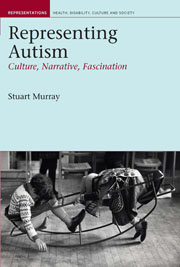Crossref Citations
This Book has been
cited by the following publications. This list is generated based on data provided by Crossref.
Mallett, Rebecca
2009.
Choosing ‘stereotypes’: debating the efficacy of (British) disability‐criticism.
Journal of Research in Special Educational Needs,
Vol. 9,
Issue. 1,
p.
4.
Cheyne, Ria
2009.
Conference Report: Theorising Culture and Disability: Interdisciplinary Dialogues.
Journal of Literary & Cultural Disability Studies,
Vol. 3,
Issue. 1,
p.
101.
Haldane, Hillary
and
Crawford, David
2010.
What Lula lacks: Grappling with the discourse of autism at home and in the field (Respond to this article at http://www.therai.org.uk/at/debate).
Anthropology Today,
Vol. 26,
Issue. 3,
p.
24.
2010.
A History of Autism.
p.
339.
Russell, Ginny
and
Kelly, Susan
2011.
Looking beyond risk: A study of lay epidemiology of childhood disorders.
Health, Risk & Society,
Vol. 13,
Issue. 2,
p.
129.
Thompson, S. Anthony
2012.
Thrice disabling disability: enabling inclusive, socially just teacher education.
International Journal of Inclusive Education,
Vol. 16,
Issue. 1,
p.
99.
Vakirtzi, Eva
and
Bayliss, Phil
2013.
Towards a Foucauldian Methodology in the Study of Autism: Issues of Archaeology, Genealogy, and Subjectification.
Journal of Philosophy of Education,
Vol. 47,
Issue. 3,
p.
364.
Holton, Avery E.
Farrell, Laura C.
and
Fudge, Julie L.
2014.
A Threatening Space?: Stigmatization and the Framing of Autism in the News.
Communication Studies,
Vol. 65,
Issue. 2,
p.
189.
Cockain, Alex
2014.
Becoming quixotic? A discussion on the discursive construction of disability and how this is maintained through social relations.
Disability & Society,
Vol. 29,
Issue. 9,
p.
1473.
Atkinson, Sarah
Evans, Bethan
Woods, Angela
and
Kearns, Robin
2015.
‘The Medical’ and ‘Health’ in a Critical Medical Humanities.
Journal of Medical Humanities,
Vol. 36,
Issue. 1,
p.
71.
Lilley, Rozanna
2015.
Trading places: Autism Inclusion Disorder and school change.
International Journal of Inclusive Education,
Vol. 19,
Issue. 4,
p.
379.
Bolt, David
2015.
Not forgetting happiness: the tripartite model of disability and its application in literary criticism.
Disability & Society,
Vol. 30,
Issue. 7,
p.
1103.
Bolt, David
2016.
Pretending to be a normal human being:Peep Show, sitcom, and the momentary invocation of disability.
Disability & Society,
Vol. 31,
Issue. 6,
p.
745.
Sherry, Mark
2016.
A sociology of impairment.
Disability & Society,
Vol. 31,
Issue. 6,
p.
729.
Cockain, Alex
2016.
Making autism throughOcean Heaven(海洋天堂,Haiyang tiantang) and the possibilities of realizing disability differently.
Disability & Society,
Vol. 31,
Issue. 4,
p.
535.
Wolgemuth, Jennifer R.
Agosto, Vonzell
Lam, Gary Yu Hin
Riley, Michael W.
Jones, Roderick
and
Hicks, Tyler
2016.
Storying transition-to-work for/and youth on the autism spectrum in the United States: a critical construct synthesis of academic literature.
Disability & Society,
Vol. 31,
Issue. 6,
p.
777.
Menard, Rusten
2016.
Analysing Social Values in Identification; A Framework for Research on the Representation and Implementation of Values.
Journal for the Theory of Social Behaviour,
Vol. 46,
Issue. 2,
p.
122.
Hollin, Gregory JS
2016.
Encyclopedia of Life Sciences.
p.
1.
Hollin, Gregory
2017.
Autistic Heterogeneity: Linking Uncertainties and Indeterminacies.
Science as Culture,
Vol. 26,
Issue. 2,
p.
209.
Conn, Carmel
and
Drew, Sharon
2017.
Sibling narratives of autistic play culture.
Disability & Society,
Vol. 32,
Issue. 6,
p.
853.



